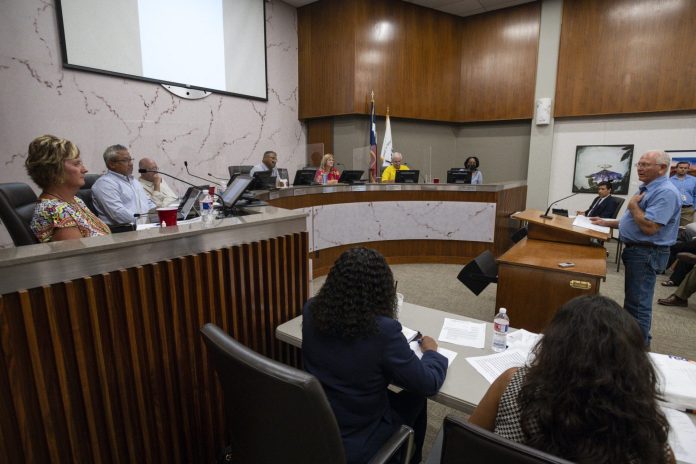
The Odessa City Council heard such a damning report about the city’s Bob Derrington Water Reclamation Plant that Mayor Javier Joven formed a committee to figure out how to come up with a plan to address issues that have gained the notice of the Texas Commission on Environmental Quality and how to pay for that plan.
Performance Services Inc. has been studying the plant for months while focusing on three things: health and safety concerns, the condition of the equipment and capacity concerns in the future.
While presenting their findings Tuesday night, Business Development Manager Jenna Shadowitz repeatedly used words like corrosion, non-functioning, malfunctioning, inoperable, uncontrollable, inefficient, degraded, unsafe, unrepairable and crumbling.
She said there was a lack of redundancy in some areas of the plant, meaning if something were to go wrong there, the city would have no backup.
The plant’s leak detection system has been “abandoned in place,” there are trip and fall issues and inadequate lighting.
Again and again, Shadowitz described various components of the plant as being at the “end of its useful life.”
Maintenance on the waterlines hasn’t been done for decades, she said.
“There is no way this stuff just appeared overnight, it’s stuff that’s been building for decades at this point,” Shadowitz said at another point.
The TCEQ has written the city up for violations, but no fines have been imposed, said Utilities Director Kevin Niles, who assumed his duties in July.
Niles said the city doesn’t have an appropriate asset management tool. In other words, there’s been a lack of appropriate documentation.
For example, he said, “We have no idea how old these valves are, when they were put in, when they were maintained, how they were maintained … We’ve got to go through storage units to find paperwork to meet TCEQ requirements. To me, that’s a problem especially with today’s technology,” Niles said.
Councilmember Mark Matta said it appears as though regularly scheduled maintenance was never performed.
“Everything that moves is going to have to be replaced so why has it waited 40 fricking years for it to get like this before … I mean we can do it every two years, replace these valves, replace these motors. It’s just mind boggling,” Matta said.
Councilmember Steve Thompson said he recently looked at the master plan created in 2018. The plan stated the plant could handle 25 more years of growth within the city. That was the one and only mention of the plant, he said.
Niles said he could only speculate on why the plant got into its current condition.
“A lot of it is you have a lot of manpower issues out there and I think, for the most part, morale got pretty low when there was a skeleton crew,” Niles said.
“I think a lack of professionalism kind of took hold there and ran through there like cancer and unfortunately they just didn’t have adequate staff to stay on top (of things).”
If the city can find qualified and passionate operators, Niles said the council would see some changes at the plant.
He and his staff have made it a priority to work on some of the safety issues at the plant, including missing handrails and unsafe staircases.
Matta said it’s no wonder the city has had a hard time finding and keeping operators given the plant’s neglect and current unsafe working environment. He also expressed his belief as to why the plant has been neglected.
“Because it’s not fancy. There’s no big bells and whistles on it. It’s not a Marriott …” Matta said.
Thompson chimed in.
”It looks like nobody’s even been out there in 25 years,” Thompson said. “That’s what it looks like, it’s totally abandoned.”
The plant is another example of past councils and administrators focusing on “extracurricular projects” rather than basic services, Joven said.
Shadowitz noted the plant’s mechanical bar screen, a mechanical filter used to remove large objects, such as rags and plastics, from wastewater, is almost 20 years old and needs to be replaced.
The city council voted 6-0 in November 2021 to rebuild the bar screen at a cost of nearly $142,000.
Joven expressed his concerns about the plant given the rate the city is growing.
Shadowitz said she could not hazard a guess as to how much it would cost to make all of the necessary repairs, but noted a new plant would cost about $300 million today.
While not eager to go into debt, Thompson noted the city is in “exactly the same position” it was in when the city council took out $95 million in certificates of obligation in 2021 to rehab the water treatment plant.
Thompson said he wants to make sure the city doesn’t “throw good money after bad” by fixing things at the plant only to learn it was to no avail.
Matta, Thompson and Councilmember Greg Connell were named to the committee by Joven. They’ll be working with the finance department, Niles, Deputy City Manager Agapito Bernal and City Manager John Beckmeyer on the plan.
City attorney Dan Jones also commented on the situation.
“I don’t know if the public truly understands what we’re talking about here. We’re talking about every time you flush your commode in the City of Odessa. That’s what we’re talking about,” Jones said. “I mean if this isn’t taken care of we will have a public calamity.”



